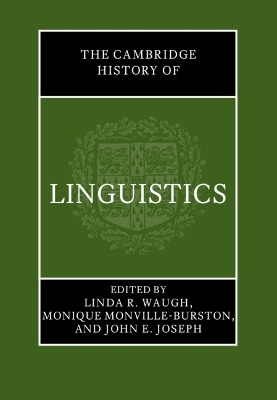
The Cambridge History of Linguistics
Cambridge University Press (Verlag)
978-0-521-84990-6 (ISBN)
The establishment of language as a focus of study took place over many centuries, and reflection on its nature emerged in relation to very different social and cultural practices. Written by a team of leading scholars, this volume provides an authoritative, chronological account of the history of the study of language from ancient times to the end of the 20th century (i.e., 'recent history', when modern linguistics greatly expanded). Comprised of 29 chapters, it is split into 3 parts, each with an introduction covering the larger context of interest in language, especially the different philosophical, religious, and/or political concerns and socio-cultural practices of the times. At the end of the volume, there is a combined list of all references cited and a comprehensive index of topics, languages, major figures, etc. Comprehensive in its scope, it is an essential reference for researchers, teachers and students alike in linguistics and related disciplines.
Linda R. Waugh is Professor Emerita at the University of Arizona and Cornell University. Her research interests include discourse analysis, history of linguistics, semiotics and French linguistics. Notable publications include The Sound Shape of Language (1979, 1987, with Jakobson), On Language (1990, edited with Monville-Burston) and Critical Discourse Analysis (2020, with Catalano). Monique Monville-Burston is Professor and Honorary Research Fellow at the Language Center, Cyprus University of Technology. Her research interests include L2 acquisition (French), Tense/Mood/Aspect, discourse analysis, and the history of linguistics. Notable publications include On Language (1990, edited with Waugh) and La Marque en lexicographie (2011, with Baider and Lamprou). John E. Joseph is Professor of Applied Linguistics in the University of Edinburgh. He has worked extensively in the history of linguistics, and his books in this area include Limiting the Arbitrary (2000), From Whitney to Chomsky (2002), Saussure (2012) and Language, Mind and Body (2018). He currently serves as president of the Cercle Ferdinand de Saussure.
Introduction: Linda R. Waugh and Monique Monville-Burston; Part I. Ancient, Classical and Medieval Periods: Introduction to Part I: The emergence of linguistic thinking within premodern cultural practices Mark Amsler: 1. Ancient near eastern linguistic traditions: Mesopotamia, Egypt Christopher Woods Andréas Stauder; 2. East Asian early linguistic traditions: China; Korea and Japan Alain Peyraube, Hilary M. Chappell and Alexander Vovin; 3. History of linguistic analysis in the Sanskrit tradition in premodern India, with a brief discussion of vernacular grammars Madhav M. Deshpande; 4. Greek linguistic thought and its Roman reception Roger D. Woodard; 5. Early to late medieval Europe Louis G. Kelly; 6. Near eastern linguistic traditions Monique Monville-Burston and Linda R. Waugh; 6A. The Syriac linguistic tradition Peter T. Daniels; 6B. The Hebrew linguistic tradition José Martínez Delgado; 6C. The Arabic linguistic tradition Kees Versteegh; Part II. Renaissance to Late Nineteenth century: Introduction to Part II: The cultural and political context of language studies from the renaissance to the end of the nineteenth century Lia Formigari; 7. Universal language schemes Jaap Maat and David Cram; 8. Locke and reactions to Locke, 1700-1780 Nicholas Hudson; 9. Rousseau to Kant Gerda Haßler; 10. The celebration of linguistic diversity: Humboldt's anthropological linguistics Jürgen Trabant; 11. Early nineteenth century linguistics Hans Henrich Hock; 12. The Neogrammarians and their role in the establishment of the science of linguistics Kurt Jankowsky; Part III. Late Nineteenth through Twentieth Century Linguistics: Introduction to Part III: Late nineteenth through twentieth century linguistics: Synopsis of major trends Monique Monville-Burston and Linda R. Waugh ; III-A. Late nineteenth century through the 1950s: Synchrony, autonomy and structuralism; 13. Move to synchrony: late nineteenth century to early twentieth century Piet Desmet and Stijn Verleyen; 14. Structuralism in Europe Daniele Gambarara, Emanuele Fadda, Lorenzo Cigana and Patrick Sériot; 15. British linguistics Michael K C MacMahon, Tony McEnery and Andrew Hardie; 16. American linguistics to 1960: Science, data, method Julia S. Falk; III-B. To 2000: Formalism, cognitivism, language use and function, interdisciplinarity; 17. Chomsky and the turn to syntax, including alternative approaches to syntax Frederick Newmeyer; 18. Functionalist dimensions of grammatical and discourse analysis Deborah Schiffrin, Colleen Cotter and Andrea Tyler; 19. Semantics and pragmatics Keith Allan; 20. Language and philosophy, from Frege to the present Jean-Michel Fortis, Bruno Ambroise, Jacqueline Léon and Mathieu Marion; 21. Lexicology and lexicography Alain Polguère; 22. Generative phonology: its origins, its principles and its successors John A. Goldsmith and Bernard Laks; 23. Phonetics and experimental phonology, circa 1950–2000 John Coleman; 24. Historical and universal-typological linguistics Anna Siewierska; 25. Language and society Florian Coulmas; 26. Language and anthropology Alessandro Duranti and Rachel George; 27. Language and psychology, 1950–present A brief overview Morton Ann Gernsbacher and Michael P. Kaschak; 28. Semiotics Winfred Nöth; 29. Applied linguistics Kees de Bot and Margaret Thomas; References; Index.
| Erscheint lt. Verlag | 10.8.2023 |
|---|---|
| Zusatzinfo | Worked examples or Exercises |
| Verlagsort | Cambridge |
| Sprache | englisch |
| Maße | 173 x 250 mm |
| Gewicht | 2240 g |
| Themenwelt | Geisteswissenschaften ► Sprach- / Literaturwissenschaft ► Sprachwissenschaft |
| ISBN-10 | 0-521-84990-X / 052184990X |
| ISBN-13 | 978-0-521-84990-6 / 9780521849906 |
| Zustand | Neuware |
| Informationen gemäß Produktsicherheitsverordnung (GPSR) | |
| Haben Sie eine Frage zum Produkt? |
aus dem Bereich


